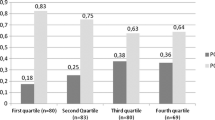Abstract
Increasing teacher quality is a major objective of recent Cambodian education policy. In mathematics education literature, pedagogical content knowledge (PCK) has emerged as a critical component of teacher quality that is strongly linked to student achievement. In this study I use data from a large survey of Cambodian schools to investigate the effect of math teachers’ PCK on third grade student achievement. I use ordinary least squares and Quantile Regression analyses to examine this aspect of teacher quality. I find that pedagogical knowledge is a strong predictor of student math achievement in Cambodia in comparison to other student, school, and background variables, but that the effect is concentrated among higher achieving students. Quantile Regression with this dataset also exposes gaps and thresholds in achievement associated with other explanatory variables. In addition, I investigate the proportional distribution of teacher PCK in Cambodia and find that lower quality teachers are more likely to be teaching lower achieving students of lower socioeconomic status.
Similar content being viewed by others
References
Adler J., Davis Z. (2006) Opening another black box: Researching mathematics for teaching in mathematics teacher education. Journal for Research in Mathematics Education 37(4): 270–296
Ayres D. M. (2000) Tradition, modernity, and the development of education in Cambodia. Comparative Education Review 44: 440–463
Ball D. L., Bass H. (2000) Interweaving content and pedagogy in teaching and learning to teach: Knowing and using mathematics. In: Boaler J. (ed) Multiple perspectives on the teaching and learning of mathematics. Ablex, Westport, CT, pp 83–104
Bedi A., Marshall J. H. (1999) School attendance and student achievement: Evidence from rural Honduras. Economic Development and Cultural Change 47(3): 657–682
Benveniste L., Marshall J. H., Caridad Araujo M. (2008) Teaching in Cambodia. The World Bank/Ministry of Education, Youth and Sport, Phnom Penh
Boyd D., Grossman P., Lankford H., Loeb S., Wyckoff J. (2009) Teacher preparation and student achievement. Educational Evaluation and Policy Analysis 31(4): 416–440
Carpenter T. P, Fennema E., Peterson P. L., Carey D. A. (1988) Teachers’ pedagogical content knowledge of students’ problem solving in elementary arithmetic. Journal for Research in Mathematics Education 19(5): 385–401
Chhinh S. (2003) Effect of pupil factor on mathematics achievement in Cambodian urban primary school. Asia Pacific Education Review 4(2): 151–160
Clotfelter C., Glennie E., Ladd H., Vigdor J. (2007) Would higher salaries keep teachers in high-poverty schools? Evidence from a policy intervention in North Carolina. Journal of Public Economics 92(5-6): 1352–1370
Duggan S. J. (1996) Education, teacher training and prospects for economic recovery in Cambodia. Comparative Education 32: 361–375
Eide E., Showalter M. H. (1998) The effect of school quality on student performance: A Quantile Regression approach. Economics Letters 58: 345–350
Filmer D. (2009) Inequalities in education: Effects of gender, poverty, orphanhood and disability. In: Tembon M., Fort L. (eds) Girls’ education in the 21st century: Gender equality, empowerment and economic growth. The World Bank, pp 96–114
Geeves R., Bredenberg K. (2005) Contract teachers in Cambodia. UNESCO IIEP, Paris
Geeves R., Vanny C., Pharin K., Sereyrith L., Heng S., Panhcharun T. (2002) Evaluation of the impact of the education quality improvement project (eqip) of the ministry of education, youth and sport of the royal government of Cambodia. World Education Cambodia, Phnom Penh
Hanushek E. A. (1986) The economics of schooling: Production and efficiency in public schools. Journal of Economic Literature 24(3): 178–204
Hanushek E. A. (1997) Assessing the effects of school resources on student performance: An update. Educational Evaluation and Policy Analysis 19(2): 141–164
Hao, L., & Naiman, D. Q. (2007). Quantile regression. Thousand Oaks, CA: Sage Publications, Quantitative Applications in the Social Sciences.
Harbison R., Hanushek E. A. (1992) Educational performance of the poor: Lessons from rural northeast Brazil. Oxford University Press, New York
Hill H., Rowan B., Ball D. L. (2005) Effects of teachers’ mathematical knowledge for teaching on student achievement. American Educational Research Journal 42: 371–406
Lankford H., Loeb S., Wyckoff J. (2002) Teacher sorting and the plight of urban schools: A descriptive analysis. Educational Evaluation and Policy Analysis 24(1): 37–62
Levin H. M. (1980) Educational production theory and teacher inputs. In: Bidwell C., Windham D. (eds) The analysis of educational productivity: Issues in macroanalysis, vol II. Ballinger Press, Cambridge, MA
Luschei T. F., Carnoy M. (2010) Educational production and the distribution of teachers in Uruguay. International Journal of Educational Development 30: 169–181
Ma L. (1999) Knowing and teaching elementary mathematics: Teachers’ understanding of fundamental mathematics in China and the United States. Lawrence Erlbaum Associates, Mahwah, NJ
Marshall J. H. (2004) EQIP school grants program evaluation: Final report. MOEYS/World Bank, Phnom Penh, Cambodia
Marshall J. H., Chinna M. U., Nessay P., Ngo Hok U., Savoeun V., Tinon S., Veasna M. (2009) Student achievement and education policy in a period of rapid expansion: Assessment data evidence from Cambodia. International Review of Education 55(4): 393–413
Mullens J. E., Murnane R. J., Willett J. B. (1996) The contribution of training and subject matter knowledge to teaching effectiveness: A multilevel analysis of longitudinal evidence from Belize. Comparative Education Review 40: 139–157
Reeves E., Lowe J. (2009) Quantile Regression: An education policy research tool. Southern Rural Sociology 24(1): 175–199
Santibañez L. M. (2002) Why we should care if teachers get A’s: Teacher test scores and student achievement in Mexico. Economics of Education Review 25: 510–520
Shulman L. S. (1986) Those who understand: Knowledge growth in teaching. Educational Researcher 15: 4–14
Turnuklu, E. B., & Yesildere, S. (2007). The pedagogical content knowledge in mathematics: Pre-service primary mathematics teachers’ perspectives in Turkey. IUMPST: The Journal, 1(Content Knowledge).
Velasco E. (2004) Ensuring gender equity in education for all: Is Cambodia on track?. Prospects 23(1): 37–51
Wayne A. J., Youngs P. (2003) Teacher characteristics and student achievement gains: A review. Review of Educational Research 73(1): 89–122
Author information
Authors and Affiliations
Corresponding author
Rights and permissions
About this article
Cite this article
Ngo, F.J. The distribution of pedagogical content knowledge in Cambodia: Gaps and thresholds in math achievement. Educ Res Policy Prac 12, 81–100 (2013). https://doi.org/10.1007/s10671-012-9133-1
Received:
Accepted:
Published:
Issue Date:
DOI: https://doi.org/10.1007/s10671-012-9133-1




